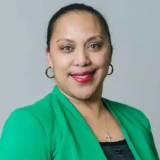
Building the foundation for Pasifika leaders to thrive

As the cultural landscape of Aotearoa New Zealand continues to evolve, there is a need for new thinking at the board table to not only harness opportunities that attract diverse stakeholders, but to ensure businesses and organisations remain relevant – and inclusive.

Litia Brighouse-Fuavao, Diversity Programmes Manager, IoD
The Institute of Directors’ Diversity Programmes Manager, Litia Brighouse-Fuavao, manages a dedicated work programme alongside the IoD’s Pacific Advisory Group (PAG) to address the needs of a burgeoning governance community.
“We have engaged with Pasifika leaders across the country over the past three years to try to find out what challenges and opportunities Pasifika directors – new and established – face, and look for ways for the IoD to support them,” says Brighouse-Fuavao.
While Pasifika leaders are “well-represented on church or community boards”, there are obstacles to entry for other governance roles, and with limited or restricted access to resources and development tools, including access to courses often being “cost-prohibitive” for those in the community.
The Pacific Advisory Group has developed a Pacific Governance Strategy that is 18 months into its implementation and already producing results for Pasifika.
Pasifika membership at the IoD has grown steadily over the past two to three years and the IoD is launching a pilot mentoring programme in Auckland in October.
The Tautua Pasifika Mentoring Programme aims to support emerging and aspiring directors to build their governance knowledge and experience in a supportive and culturally safe environment.
“When we look at statistics for private sector and public sector boards, Pasifika have very few seats at the table outside of Pasifika-focused groups or committees,” says Brighouse-Fuavao.
Her role, with the help of the Pacific Advisory Group, is to not only build that pipeline of Pasifika leaders who are board-ready and able to take on roles, but also making sure those making decisions when recruiting – including nominations committees, board chairs and recruitment companies – are casting a wide net “and not discounting Pasifika people for those roles”.
Brighouse-Fuavao says Pasifika communities have thousands of years of traditions and cultural practices that are based on collective decision-making, with a unique selling proposition.
“They are hard-wired to look at the needs of their communities, rather than the individual first, which makes them ideal candidates for board roles. However, the divide between cultural practice and western governance still exists, so how do we bridge that?”
Brighouse-Fuavao says Pasifika people are often stereotyped because of “a lack of understanding of what they can bring to the table” – a barrier to entry that was identified through a series of workshops.

Rachel Afeaki-Taumoepeau CFInstD
Rachel Afeaki-Taumoepeau CFInstD, a member of the Pacific Advisory Group, says the Pacific Governance Strategy addresses these issues and looks for ways to engage, and support the growth of Pasifika leaders in Aotearoa, including promoting governance best practice.
“Cultural values and ‘ways of being’ make it difficult for Pasifika people to competitively position themselves in interviews, which gets in the way of identifying their unique value proposition, so there is a need to build confidence within individuals and the community. Mentoring can support this,” says Afeaki-Taumoepeau.
The first Pasifika Chartered Fellow of the IoD, Afeaki-Taumoepeau sits on the Waikato branch committee and says to understand the nuances of the cultural differences and value-add, learning is required to build a foundation of communication, understanding and knowledge.
The Pacific Advisory Group’s role is, in part, to lay the foundations for change, engaging the wider governance community to see the value of including a unique Pacific perspective at the board table.
“This has been a huge undertaking and one we don’t take lightly. Part of our role is to challenge perspectives and break down cultural barriers . . . and boards must understand that. With New Zealand’s changing demographics, if they are not willing to adapt and include diverse perspectives they will be left behind.”
The Pacific Advisory Group is comprised of volunteers from the Pasifika governance community. Experienced and esteemed directors, they are passionate about building capability and making space for the next generation of Pasifika leaders in Aotearoa.
Find out more about the role of the Pacific Advisory Group here.


